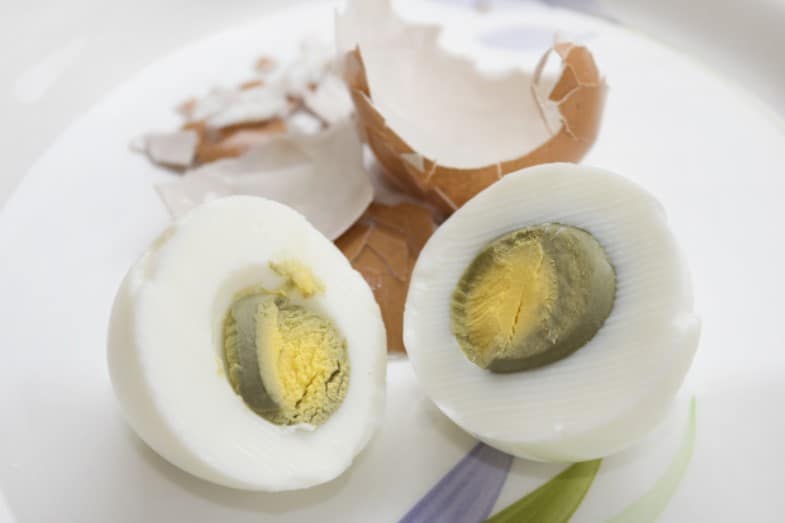It can be difficult to know exactly when an egg is perfectly boiled. This leads some people to question if they need to pull the egg from the pot at a specific time or can they just let it boil for a while. Can you over-boil an egg?
You can over-boil an egg if you boil it longer than about 12 minutes. Eggs should be boiled from about 5 to 12 minutes, depending on whether you want the egg soft-boiled or hard-boiled. You should set a timer, and when the timer goes off, you should put the boiled egg in cold water so that it stops cooking immediately.
If you over-boil an egg, a chemical reaction occurs between iron, sulfur, and hydrogen. This reaction forms the compound hydrogen sulfide.
This chemical reaction gives the egg an unappetizing appearance, smell, and taste. It makes the egg yolk greenish-gray and the egg white brownish-gray. Also, it makes the smell of the egg foul, like sulfur, and makes the taste of the egg bland and the texture rubbery.
So over-boiling an egg makes it less appetizing; however, it is still safe to eat. An over-boiled egg will not poison you unless you consume hundreds of them in one sitting. It will only make you sick if you are put off by the foul smell, taste, and appearance.
Read on to learn more about what happens when an egg is over-boiled and tips on how to boil eggs properly.
Can You Over-Boil an Egg?
You can over-boil an egg if you boil it longer than about 12 minutes. Eggs should be boiled from about 5 to 12 minutes, depending on whether you want the egg soft-boiled or hard-boiled.
A hard-boiled egg normally has an opaque yellow egg yolk and a tender egg white. When boiled perfectly, it looks truly enticing. But no matter how easy it seems to cook an egg, we still make common mistakes along the way. One of which is over-boiling it.
Can you boil an egg too long? Yes. But if you over-boil an egg, it doesn’t only affect the appearance – it will also affect the egg’s odor. Let’s further discuss the changes that occur when you over-boil an egg.
The Appearance of an Over-Boiled Egg
Over-boiled eggs do not look too appetizing. The egg white turns brownish while the egg yolk turns greenish-gray in color. Do you want to consume an egg that looks bad?
These color changes occur due to a chemical reaction between the sulfur and iron content of the egg. The sulfur is present in the egg white, whereas the iron is present in the egg yolk. Moreover, this chemical reaction occurs when you expose the egg to a high temperature. It then creates the chemical compound known as iron sulfide.
So, can you over-boil eggs? Yes, the longer you boil an egg, the more iron sulfide is created. It means that the greenish-gray color in the egg yolk becomes all the more evident. This explains why overboiling eggs result in discoloration.
The Smell of an Over-Boiled Egg
When cooking or boiling an egg, the egg yolk releases iron. And aside from sulfur, the egg white also releases hydrogen.
When you over-boil an egg, its iron, sulfur, and hydrogen content create a chemical reaction. It creates the chemical compound known as hydrogen sulfide, which explains the foul smell of eggs.
If you notice your hard-boiled egg to be a bit smelly, this means that you probably over-boiled it. Can you just imagine how smelly the eggs will be when you leave them boiling for hours?
Recipe and Cooking Tips for Jalapeno Bacon
Is It Safe to Eat an Over-Boiled Egg?
For sure, you are wondering whether an over-boiled egg is safe to eat or not. The texture of over-boiled eggs indeed becomes rubbery with a bit of discoloration. It is also true that the eggs create a foul smell. But, generally speaking, over-boiled eggs are safe to eat.
Yes, hydrogen sulfide may also be dangerous. However, you would need to consume hundreds of over-boiled eggs in one sitting to make the amount of hydrogen sulfide dangerous. But then again, why on earth would somebody want to eat hundreds of over-boiled eggs?
The bottom line is, yes, it is safe to eat an over-boiled egg. But for sure, you wouldn’t want to eat one anyway. So the main point here is to ensure not to over-boil a hard-boiled egg. And what better technique there is than to use your timer every time you try to boil one.

How Long Does It Take to Boil Eggs?
To prevent you from over-boiling your eggs, let me give you an idea as to how long you are supposed to boil them.
There are, in fact, several types of soft-boiled and hard-boiled eggs. Let’s discuss them all to help you master the art of boiling them.
Soft-Boiled Eggs
Do you want your egg yolk to look somewhat runny while the egg white is slightly loose? If yes, boil it for approximately four minutes. Should you not want the egg white loose but want the egg yolk to still look runny, boil it for at least five minutes.
And if you want to put the egg on the bread, it has to be spreadable and jammy. To achieve this, you have to boil the egg for at least seven to eight minutes. But if you want it to be semi-jammy only, then boiling it for at least 10 minutes will suffice.
Hard-Boiled Eggs
You can use a hard-boiled egg with a slightly creamy yolk for ramen. To achieve this type of hard-boiled egg, boil the egg for 10 to 11 minutes. However, some chefs boil it for only seven to eight minutes. Then, they let it continue to cook once placed in a bowl of steaming hot ramen.
The type of egg normally mixed in salads, such as potato salad, fruit salad, and vegetable salad, is described as a fully hard-boiled egg. It is fully cooked but not overcooked. You can achieve this by boiling the egg for 12 to 15 minutes.
We’ve answered the question, “Can you over-boil an egg?” – in general; next, let’s look at some tips for cooking hard-boiled eggs.
Tips for Cooking Hard-Boiled Eggs
Eggs are a staple in most households, giving everyone the impression that they are easy to cook. But the reality is, it is indeed frustratingly difficult to cook a perfect one – whether it is sunny-side up, scrambled, or boiled.
In an attempt to help you prevent over-boiling your eggs, let me share with you some cooking tips. They are as follows:
1. Use the Correct Pan
When boiling eggs, make sure that you are using the appropriate pan. Check if there is enough space for the eggs to move around when the water begins to boil. Eggshells can crack if there is not enough space in the pan.
And even if eggshells remain intact, there is a big chance that the eggs will not cook evenly. Thus, you may not achieve the desired result.
2. Place Eggs in the Pan Before You Place the Pan on the Stove
When preparing to cook hard-boiled eggs, the process begins by placing the eggs carefully inside the pan. Then, fill the pan with the right amount of cold water. Place the pan on the stove and turn the heat up. This process allows you to cook the eggs evenly. It will also prevent eggshells from cracking.
If it is your first time boiling eggs, never put them in a pot of boiling water. It will result in uneven cooking. Worse, it will result in eggshell cracking.
3. Don’t Use Eggs That Are Too Fresh
When you buy fresh eggs, keep them in your fridge for a few days before boiling. If you can keep them for a week, it is actually even better. The reason is that older eggs are easier to peel after a hard boil. On the contrary, eggs that are too fresh are a bit difficult to peel. Peeling it would be tricky, especially if we are in a hurry. It might even take us forever to peel hard-boiled fresh eggs.
However, if you don’t see this as a problem, then nobody’s stopping you from boiling fresh eggs. After all, when it comes to the egg’s nutritional content, it all remains intact. Whether you boil fresh eggs or older ones, you nonetheless get the same health benefits once you consume them.
4. Once You See the Water Boiling, Turn Off the Stove
If you don’t consider yourself an expert when it comes to boiling eggs, then this trick will surely help you.
As mentioned earlier, place the eggs in the pan first. Pour the right amount of cold water into the pan. Next, place the pan on the stove, turn it on, and bring the water to a boil.
And once the water boils, you may turn off the stove. Cover the pan and just let it sit for another 10 minutes. This technique will result in creamy hard-boiled eggs. Should you want fully hard-boiled eggs, simply let them sit for approximately 15 minutes.
If you follow this trick, you might not need a timer anymore. However, close monitoring of the boiling eggs is still highly recommended.

5. Your Hard-Boiled Egg Needs an Ice Bath
Allow your hard-boiled eggs to take an ice bath to prevent them from getting over-boiled.
If you are using a timer, the procedure is to turn off the stove once the timer buzzes. However, even if you simply remove the pan from the stove, the heat will continue to cook the eggs. The exact thing happens if you remove the eggs from the pan and simply set it aside. It is still hot and will continue to cook the eggs. Do not be surprised if the eggs become over-boiled.
The right thing to do is submerge the eggs in cold water as soon as the timer buzzes. Immerse them until they are completely cooled. This technique will prevent them from getting over-boiled.
Can you over-boil eggs when you want a soft yolk? See the next section for making soft-boiled eggs.
Can You Over-Boil a Soft-Boiled Egg?
We have been talking about over-boiling hard-boiled eggs since the start of this article. But is there such a thing as over-boiling soft-boiled eggs? Of course, there is. Simply put, if you are trying to cook soft-boiled eggs, but you end up with hard-boiled eggs, this apparently means that you over-boiled them.
There are ways to prevent overcooking your soft-boiled eggs. Let me give you an idea as to how long you should soft-boil eggs.
Boil a single egg in a pan for approximately three minutes. But if you have two eggs, boil them for more or less four minutes. Three eggs in a pan should take a maximum of six minutes, while four eggs in a pan will take seven minutes.
Six eggs in a pan should at least take you seven to eight minutes. Should you have 12 or more eggs in one big pan, it might take you 8 to 10 minutes to boil them. However, it is not advisable to boil 12 eggs in a pan all at the same time. It’s better to boil them in batches of four or six to prevent over-boiling.
At What Temperature Is Bacon Cooked in the Oven?
Conclusion – Can You Over-Boil Eggs?
Can you over-boil an egg? Yes, it is possible to over-boil an egg. In fact, it is quite normal to over-boil one once in a while, especially if you’re multitasking. Generally speaking, eggs are boiled up to a maximum of 12 minutes. If you boil them longer than usual, they will have a rubbery texture.
An over-boiled egg will have a brownish egg white, whereas the egg yolk becomes somewhat greenish-gray in color. In short, the appearance becomes less appetizing. Nevertheless, over-boiling doesn’t make them unsafe for consumption.
Aside from the appearance, an over-boiled egg also produces a foul smell. This results from the chemical reaction produced by iron, sulfur, and hydrogen. While it may not be unsafe to eat an over-boiled egg, it is not recommended to eat one too.
There are ways to prevent your hard-boiled eggs from getting overcooked. They are as follows:
- Use the correct pot
- Place eggs in the pan before placing the pan on the stove
- Don’t use eggs that are too fresh
- Once you see the water boiling, turn off the stove
- Your hard-boiled egg needs an ice bath
Soft-boiled eggs also have a tendency to get overcooked and become hard-boiled eggs.
Again, boiling eggs may seem easy to do. But in reality, it can be tricky. It requires mindfulness and close monitoring to achieve the type of boiled egg you want.
Read next:

![Read more about the article Does Salt Make Water Boil Faster? [Adding Salt – Time to Boil]](https://howchimp.com/wp-content/uploads/2020/11/does-salt-make-water-boil-faster-300x200.jpg)

